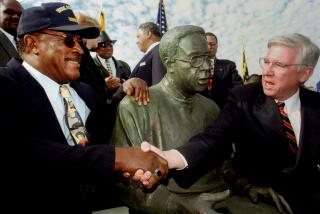Recalling a Voice From the Past: Baritone John Charles Thomas
- Share via
The baritone voice of John Charles Thomas was familiar to radio listeners across the nation 50 years ago, but his fame had faded by his death in 1960.
The centenary of his birth passed last year with little notice, disappointing a friend, William R. Osteck, who had hoped it would be the occasion for the reissue of some of Thomas’ recordings of such songs as “Home on the Range” and “The Lord’s Prayer.” When this didn’t happen, Osteck decided to pay tribute himself by gathering anecdotes about Thomas and lecturing on his career.
Osteck will deliver his lecture and play one of Thomas’ radio shows at 2 p.m. today at the Donald R. Wright Auditorium at the Pasadena Public Library, 285 E. Walnut St., Pasadena. Admission is free.
Billed on radio as “America’s beloved baritone,” Thomas began his career in a 1913 Broadway review and became a leading man in operettas. He appeared at the Metropolitan Opera, was one of the nation’s highest-paid concert performers in the ‘30s and ‘40s and made one movie.
But it was radio that gave him his largest audience.
He started on experimental broadcasts from the Edison laboratories in New Jersey. From 1927 through the early ‘50s, he had several radio shows and appeared frequently as a guest on other programs. His most memorable series was the Westinghouse radio program on the NBC network on Sunday afternoons during World War II. Thomas sang with a 50-piece orchestra conducted by Victor Young and an 18-voice chorus led by Ken Darby.
Osteck got to know Thomas while taking singing lessons from him in the ‘50s. He said Thomas had a colorful personal life as well as a notable career. Thomas played high school football against Jim Thorpe, traveled to concerts by private railroad car, raised chickens and pigs in Mandeville Canyon and finally retired to Apple Valley, where he acquired a ranch in exchange for his promotional work for a real estate developer.
Osteck, who markets a collection of Thomas’ radio broadcasts on audiocassette, said his lecture on Thomas is geared to those who remember the broadcasts. “There’s not too many of us left,” he said, but he hopes to meet some of them in Pasadena today.
More to Read
The biggest entertainment stories
Get our big stories about Hollywood, film, television, music, arts, culture and more right in your inbox as soon as they publish.
You may occasionally receive promotional content from the Los Angeles Times.










